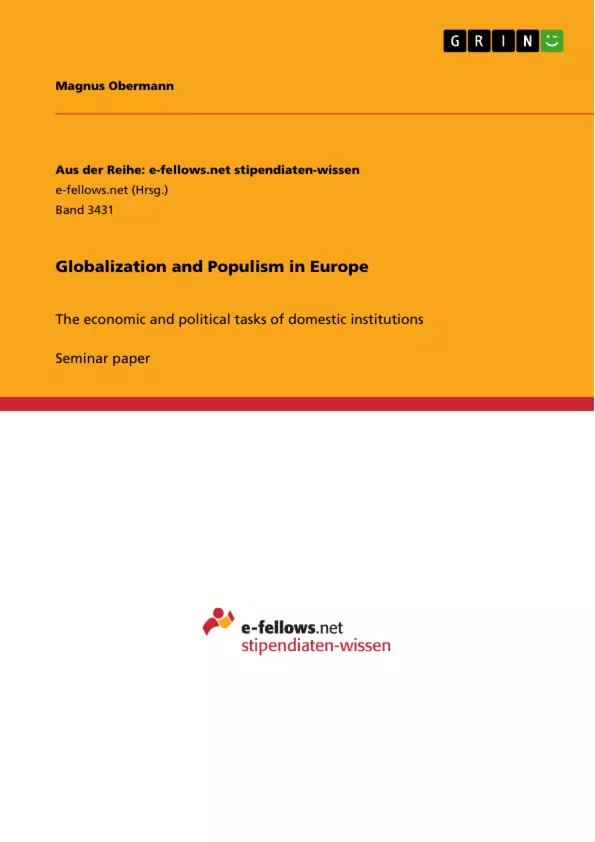This paper is dedicated to the question how so-called globalization shocks affect voting outcomes and the rise of populism. The thesis brought forward is that strong ‘domestic institutions’ help soften the societal turmoil caused by globalization, both economically and politically. Building on existing arguments (Rodrick, Manow), the paper argues, however, that the mere existence of strong domestic institutions in the established sense is not enough to prevent populist movements from rising, but needs to be accompanied by feasible policies and a problem-oriented rhetoric that addresses the whole of society. Doing so, the essay systematically distinguishes between economic and political tasks of domestic institutions. The hypothesis is that populists are only successful if domestic institutions fail to fulfil their economic or political task, or in other words, when either ‘domestic economic institutions’ or ‘domestic political institutions’ fail. To prove the argument, the paper looks at different examples of domestic institutions in Europe and measures their success in recent elections (reflected in the voting share for populist parties, as of July 2019).
Inhaltsverzeichnis (Table of Contents)
- Introduction: What this paper is about.
- Prelude: Globalization & Populism
- The argument I: Populist Strategies
- The argument II: The role of Domestic Institutions
- Conclusion I: The economic and the political task of domestic institutions….....
- Comparable analysis: Anti-populist strategies in Greece, Italy, and Denmark
- Greece
- Italy
- Denmark
- Conclusion II: Different ways to counter populism.
Zielsetzung und Themenschwerpunkte (Objectives and Key Themes)
This paper explores the relationship between globalization and the rise of populism in Europe, focusing on the role of domestic institutions in mitigating the societal turmoil caused by globalization. It argues that the presence of strong domestic institutions, while necessary, is not sufficient to prevent the emergence of populist movements. The paper emphasizes the need for effective policies and a problem-oriented rhetoric that addresses societal concerns.
- The impact of globalization on voting outcomes and the rise of populism
- The role of domestic institutions in mitigating the societal effects of globalization
- The importance of effective policies and problem-oriented rhetoric in addressing societal concerns
- The distinction between economic and political tasks of domestic institutions
- The analysis of different anti-populist strategies implemented in Greece, Italy, and Denmark
Zusammenfassung der Kapitel (Chapter Summaries)
- Introduction: What this paper is about. This chapter introduces the research question and the main argument of the paper, which focuses on the role of domestic institutions in mitigating the impact of globalization shocks on voting outcomes and the rise of populism. The paper argues that strong domestic institutions need to be accompanied by effective policies and a problem-oriented rhetoric to address societal concerns.
- Prelude: Globalization & Populism. This chapter explores the interconnectedness of globalization and populism. It examines how globalization, with its free flows of goods, services, people, and ideas, creates both opportunities and anxieties. The chapter emphasizes the economic and political challenges posed by globalization, including job displacement, wealth inequality, and weakening of domestic institutions.
- The argument I: Populist Strategies. This chapter analyzes populist strategies and how they exploit societal cleavages to gain political power. Drawing on the work of Dani Rodrik, the chapter distinguishes between right-wing and left-wing populism, both of which seek to polarize a portion of the population by scapegoating a specific group.
Schlüsselwörter (Keywords)
This paper focuses on the interrelationship between globalization, populism, and domestic institutions. Key terms and concepts include globalization shocks, domestic institutions, populist strategies, economic and political cleavages, anti-populist strategies, and European case studies.
Frequently Asked Questions
How does globalization influence the rise of populism?
Globalization shocks create economic and political turmoil. If domestic institutions fail to mitigate these effects, populist movements tend to gain more support.
What are "domestic institutions" in this context?
They are the economic and political structures within a country intended to soften the societal impact of global economic shifts, such as wealth inequality or job displacement.
Why isn't the mere existence of strong institutions enough?
The paper argues that institutions must also implement feasible policies and use problem-oriented rhetoric to address the concerns of the entire society to prevent populist rise.
What is the difference between right-wing and left-wing populism?
Both seek to polarize the population, but they differ in their choice of scapegoats and the specific societal cleavages they exploit.
Which European countries are analyzed in the case studies?
The paper provides a comparable analysis of anti-populist strategies in Greece, Italy, and Denmark.
- Quote paper
- Magnus Obermann (Author), 2019, Globalization and Populism in Europe, Munich, GRIN Verlag, https://www.grin.com/document/899590



